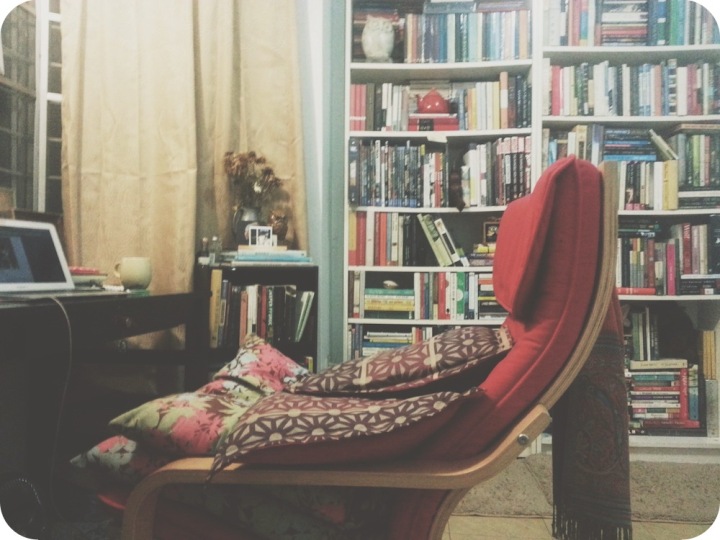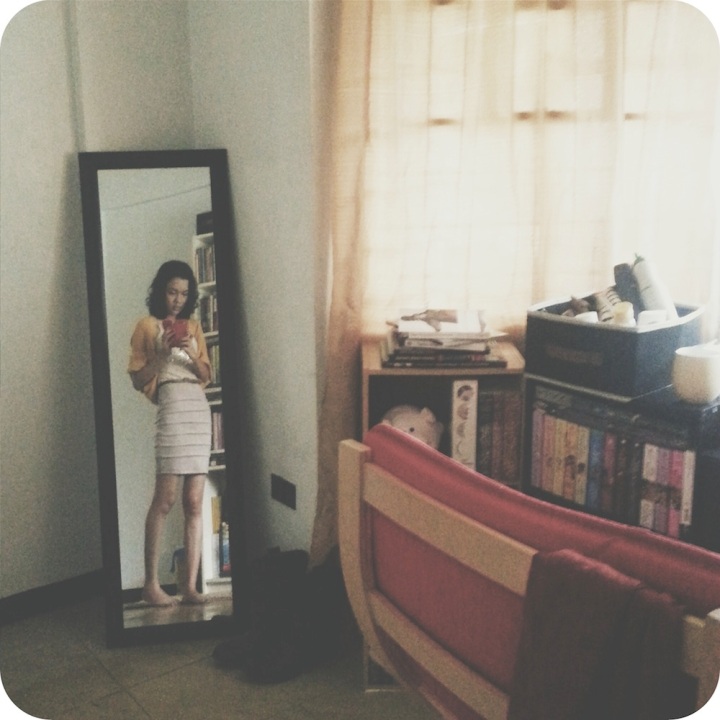
Count on me to have started the reading year in a very contrived manner: I settled down with Marcel Proust’s blindingly difficult-going Days of Reading [translated from the French by John Sturrock] a few hours into 2014—which is to say I toiled for it. There it is, small and slim and with one of the smartest covers I’ve seen—and its title so obviously bibliophilic, and one that teases with prophesy. 2014, you see, needs to be made on days upon days—and not a few nights—of reading, and I wasn’t above superstitious first-book-choices to ensure that. Added points to for my having wanted it for years and years—then letting go of that wanting, only to stumble upon the book during a manic night of Christmas shopping.
But it took work, Proust and I—my mind is too restless, and his long sweeps continue to agitate me. My motivations for forging onward had a hint of desperation to them, and when I could approximate being comfortable enough to spend time with the book, it would stem from me sitting as politely as I could while Proust preached, me focusing all I could on his fluid and breathlessly worded yet kilometric digressions. [With my failed attempt with Swann’s Way last year and my discomfort with Days of Reading this year, I think I must be content to note that Proust and I will never be fast friends.]
But I persisted—I worked to persist—and I changed gears, and occasionally a clarity would present itself to me. “Who cannot recall, as I can,” Proust writes in one essay, “the reading they did in the holidays, which one would conceal successively in all those hours of the day peaceful and inviolable enough to be able to afford it refuge?” And it was all too simple for me break away for a moment and just remember all the books—the fast-paced novels, the comic books, the romances, that one dip in a much-loved biography—I’d been free to spend my time with in the past two weeks. I kept the stillness when Proust talked about John Ruskin, when he talked about walks in the park, when he argued for solitude, when he championed young writers. Obediently, I took notes; when he said something that rang true with me, I copied the words onto my notebook, nodding all the while. “In reading, friendship is suddenly brought back to its original purity. There is no fake amiability with books. If we spend the evening with these friends, it is because we genuinely want to. We often take leave of them, at least, only with regret. And once we have left them, none of those thoughts that spoil friendship: ‘What did they think of us?’ ‘Were we not tactless?’ ‘Did they not like us?’ or the fear of being forgotten in favour of someone else. All these qualms of friendship expire on the threshold of the pure and peaceful form that is reading.”
That passage made me remember a party thrown by our housemate about a month ago—friends and colleagues and strangers had the run of the place, and conversations and cracks of laughter drifted up at me in my room—My Room! A room of my own!—where I was reading (to its end) Stephen King’s Doctor Sleep. [I half-kid now that my real, good friends can be roughly divided into the people who know, when they ask me to hang-out, that six hours will be spent only occasionally talking because there were books both of us had to read; and those who good-naturedly tease me about preferring the company of books over people and tolerate it, accept it, but mostly just understand it.] It’s a good-sized room, if awkwardly shaped—but it’s spacious enough to hold the detritus of Real Life, and a desk, and shelves, and a lot of books. And it’s my room, most importantly. [“I’ll build you a Fortress right here,” the P. had promised when I’d left my home in the sky. It’s closer to the ground, yes, but it’s right across our bedroom, and right above the workshop and its noises of P. doing his art. It is joy.]
The spring-cleaning mood that caught up to me on New Year’s Eve yielded bookshelves as I’ve never seen them before—neat, organized: I can now see every book in the room—and a homey-ness to the second iteration of the Fortress of Solitude [erm, my study, and mine alone] that had been absent until then. My desk/dresser remains clean—the makeup squirrelled away in a toolbox I’d snagged from the P., photos and clippings and tiny trinkets and candles and a jar of pens in their rightful places—curtains and fluffy area rugs have been reinstalled, the room smells of apples. Every day, for the past week: I’ve crawled from our bed to this room, curled up in my red lounge chair—the seat bolstered with pillows—squinted against the sun, smoked, sipped my coffee. When I had to work there, I did so with more calm in recent memory. And when I read, it was with ease—and the reading and the daydreaming and the scribbling and the agreeing with the text and arguing with the text was just so seamless.
“For myself,” Marcel Proust writes, “I only feel myself live and think in a room where everything is the creation and the language of lives profoundly different from my own, of a taste the opposite of mine, where I can rediscover nothing of my conscious thought, where my imagination is exhilarated by feeling itself plunged into the heart of the non-self.” I understand Proust’s meaning here, but feel immensely giddy that I am allowed a more literal interpretation. I am in the mad throes of love with my room—it’s my very own Room of Requirement. The good books are better, and the blows are softened when I’m with the books that don’t like me so much. Look at my time with Proust. Take, too, for example, the books I’ve read since the year began: I wanted to read something like Alberto Manguel’s odes to reading—but opted instead for his novel, All Men Are Liars [translated by Miranda France], which yielded only underwhelming results; I joined a readathon just this weekend and my disappointing turn with the impressively cold and calculating Story of O, the erotica classic by Pauline Réage [and translated by Sabine d’Estrée] was met with only a sigh and a shrug. But in this room, too, I read the last Sherlock Holmes stories I would ever get to read for the first time: The atrocious collective that is The Case-Book of Sherlock Holmes, but one unforgettable to me because of what it means, what its reading signaled.
I know it won’t last—am I not, after all, of a fickle nature, not to mention horrid at keeping things neat?—but I’m savoring every moment I have in this room, and I’m looking forward to the days and nights-into-days of reading that it will host. The detritus will find a way to rise, inch across my desk and on the floor; the books will ever so surely contrive a disarray; Real Life will intrude and I’ll be too weary to even try to stop it. But—and, yes, almost a chant of mine now—I will keep reading, I will immerse myself in what Proust rather earnestly dubs as “merely the noblest of distractions”—for as long as the floors gleam, for as long as I have a clear view of every book in the room, for as long as that red chair will hold me. And even after, of course—of course.
_____
I also read Proust’s Days of Reading as part of Long-Awaited Reads Month, hosted by Ana and Iris. January’s for reading the books that have mouldered in your bookshelves, pining away (almost bitterly) for you. Skedaddle.


3 thoughts on ““Merely the noblest of distractions.””